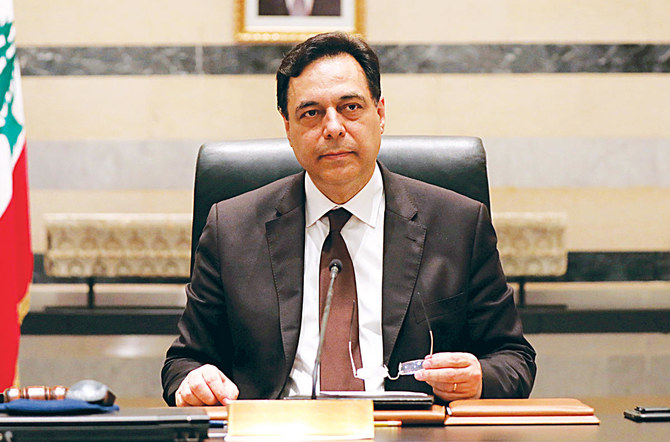BEIRUT: There is fury in Lebanon after the judge leading the probe into last year’s Beirut blast hit the country’s prime minister with a subpoena, a decision described as a “dangerous and unprecedented step” affecting the highest political position in the Sunni community.
At least 215 people died and thousands more were wounded when tons of ammonium nitrate exploded on Aug. 4, 2020.
Prime Minister Hassan Diab and his government resigned following the tragedy, although he has stayed on in a caretaker capacity until a new administration is formed.
Senior political figures accused Lebanese President Michel Aoun of negligence, saying he was aware of the danger that the ammonium nitrate posed but “did nothing to avoid a possible disaster.”
“The subpoena affects the highest political position of the Sunni community in Lebanon and excludes Aoun, who was aware of the danger these tons of ammonium nitrate pose and did nothing to avoid a possible disaster,” according to the former prime ministers.
“Never, in the history of Lebanon, has a subpoena been drawn up against a prime minister like the one Judge (Tarek) Bitar issued,” they said, as they rejected his “selective justice and politicized judiciary.”
They added that the “dangerous (and) unprecedented step represented a not-so-innocent action” that took advantage of the law and the anger of the families of the victims to undermine Diab’s position, excluding all other high-ranking positions in the country which were responsible for the crime.
“This step is fraught with political suspicions because it goes in line with years-long attempts to overturn the Taif Agreement (a power-sharing arrangement between Christians and Muslims) and weaken the prime minister’s stature. Such actions have been committed over the past couple of years to disrupt the formation of a government and limit the constitutional powers of the prime minister-designate.
“Aoun personally admitted that he knew of the presence of these large quantities of ammonium nitrate at the port 15 days before the date of the explosion. These materials were brought to Lebanese territory without prior permission from the Cabinet and the relevant military and security authorities, because of the enormous danger these materials pose. Fifteen days is a long enough period to dismantle a nuclear bomb, so why not dispose of explosive materials?
HIGHLIGHTS
• Senior political figures accused Lebanese President Michel Aoun of negligence, saying he was aware of the danger that the ammonium nitrate posed but ‘did nothing to avoid a possible disaster.’
• Hezbollah secretary general Hassan Nasrallah has been criticizing Bitar for weeks, demanding he provide evidence to support his decision to summon current and former officials for questioning.
“The president’s immunity should be lifted with regard to this serious crime, and then the judicial investigator will be freed from articles that do not give him legal and constitutional rights to try presidents and other officials.”
The Consultative Gathering, a Sunni parliamentary bloc affiliated with Hezbollah and its allies, also criticized Bitar’s decision.
“Bitar disregarded all those who covered and participated for years in the negligence that turned into a crime against the homeland and decided to target Diab and make allegations against him,” they said. “He made a dangerous, unprecedented step by issuing a subpoena against him. Bitar would not have dared to do so had Diab been a leading sectarian figure in this country that has turned into a sad laughing stock. The decision to accuse Diab of violating his duties ought to be made by Parliament, according to Article 70 of the constitution. Bitar committed a constitutional violation.”
They stressed that they opposed “defying” the prime minister’s stature and “treating this position as a scapegoat.”
Hezbollah secretary general Hassan Nasrallah has been criticizing Bitar for weeks, demanding he provide evidence to support his decision to summon current and former officials for questioning. “The investigation is politicized. Either it works clearly, or the judiciary must find another judge,” he said.
On Friday, the Parliament’s General Secretariat reacted to Bitar’s action by saying it was not up to the judiciary to decide on his jurisdiction. “Parliament follows up on this matter in preparation for the necessary procedures.”
The immunity of former ministers Ali Hassan Khalil, Ghazi Zeaiter, Youssef Fenianos and Nohad Machnouk has not yet been lifted to allow Bitar to interrogate them, after he accused them of negligence.
Bitar also does not have permission to pursue the heads of General Security, State Security, and judges.
Lebanon’s Public Prosecution hinted that it might reject the subpoena against Diab because it was “impossible to implement it, as he is a current prime minister and not a former one, and since all the security services are affiliated with him.”
Lebanon’s Grand Mufti Sheikh Abdul Latif Derian also raised the subpoena scandal during a Friday sermon at the inauguration of a new mosque in Beirut. The inauguration was attended by Diab and Lebanon’s Prime Minister-designate Najib Mikati.
“The prime minister’s position is just as important as any other leading position in Lebanon, and targeting the caretaker prime minister is reprehensible as well as it is an offense to the way of behaving with a prime minister,” Derian said, calling on Parliament to issue a law to lift “all immunities” for the probe.
“Let justice take its course by all means, without any selectiveness, discretion and maliciousness,” added the cleric.


























